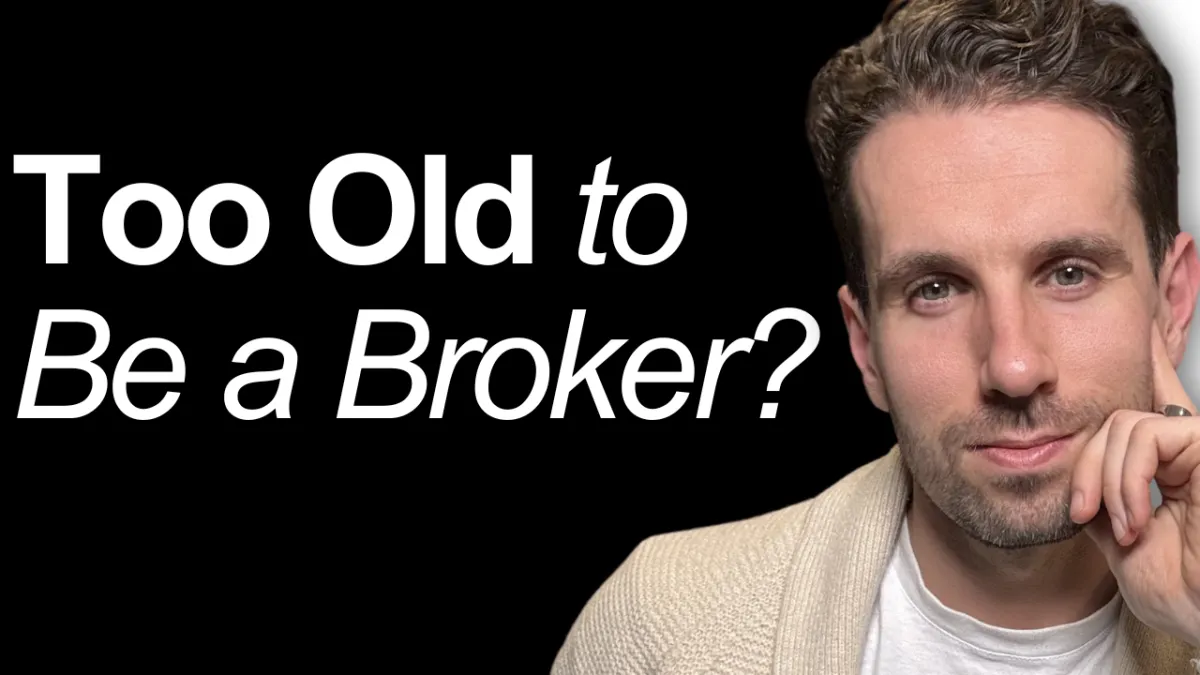Check out my YouTube channel for even more content HERE

Can You Become a Mortgage Broker in Your 50s? (The Truth About a Mid-Life Career Change)
Can You Become a Mortgage Broker in Your 50s? (The Truth About a Mid-Life Career Change)
Is It Too Late to Start a Career as a Mortgage Broker in Your 50s?
I’ve had countless conversations with people in their 50s who feel stuck in their careers, wondering if they’ve missed the boat on making a change. And I get it—reinventing yourself at this stage can feel daunting. But let me tell you something: mortgage brokering is one of those rare careers where life experience isn’t just useful—it’s an advantage.
If you're looking for a way to escape the 9-to-5, earn a solid income, and have flexibility, then this could be a career worth considering.
What Makes Mortgage Brokering a Good Career for Over-50s?
Many people assume that starting fresh in a new industry means starting from scratch, but that’s not the case in mortgage brokering. The skills you’ve built over a lifetime—relationship-building, problem-solving, and communication—are exactly what makes a great broker.
Plus, this career isn’t just for those wanting to go full-throttle. If you’re looking for something semi-retired, where you can work flexible hours but still generate a decent income, mortgage brokering could be a perfect fit.
If you're considering this path, check out my video: "Is Mortgage Broking a Good Career in the UK?"
What Happens If You Don't Take Action?
I’ve seen too many people stay in roles they no longer enjoy because they think changing is too risky. But what’s the alternative? Feeling unfulfilled? Staying in a job that drains you? Watching opportunities pass by because you’re afraid it’s too late?
The biggest risk isn’t trying something new—it’s doing nothing at all. If you’re not happy with your current situation, you owe it to yourself to explore your options.
Why Is Mortgage Brokering a Great Career Change in Your 50s?
Does Life Experience Help? – Clients trust brokers who understand their needs, and your years of experience in any field give you an edge in building rapport and offering tailored advice.
Can You Work Flexibly? – Whether you want to go full-time or take on a part-time role in semi-retirement, you control your workload and schedule.
How Much Can You Earn? – Commission-based income means your effort determines your reward. Many brokers earn six figures once established, even working part-time. Watch my video on "How Much Can You Earn as a Mortgage Broker in the UK?"
Are There High Barriers to Entry? – Unlike careers requiring years of study, the CeMAP qualification can be completed in months, making this an accessible option for career changers.
Is There Demand for Mortgage Brokers? – The mortgage industry is always evolving, and with increasing complexity in lending, brokers remain in high demand.
What Are the Challenges of Becoming a Mortgage Broker in Your 50s? (And How to Overcome Them)
Of course, no career is without its hurdles. Here’s what to watch out for:
Is There a Steep Learning Curve? – Understanding regulations, mortgage products, and compliance takes time, but structured learning and mentorship help smooth the transition.
Will You Struggle with Income at First? – It may take time to build a steady income, so financial planning is crucial in the early months.
Can You Find High-Value Clients? – One challenge for those in their 50s is that their immediate network may consist of peers who are paying off their mortgages rather than taking on new loans. Expanding beyond this network and targeting high-value clients is key.
Are Digital Skills Necessary? – Digital tools and social media marketing are essential for success. Investing time in learning these skills can give you a competitive edge. Check out my video on "How Mortgage Brokers Build Long-Term Client Relationships"
How Can You Get Started as a Mortgage Broker in Your 50s? (Step-by-Step Guide)
If you’re serious about making this career change, here’s a simple roadmap:
Get Your CeMAP Qualification – This is the entry-level requirement for becoming a mortgage adviser in the UK.
Decide on Employment vs. Self-Employment – You can either work for a firm or become an independent mortgage broker. Both have pros and cons.
Register with the FCA – If you go self-employed, you’ll need to register directly with the Financial Conduct Authority or join a mortgage network.
Start Networking and Marketing – Your initial clients may come from referrals, but building an online presence will help attract more business.
Invest in Ongoing Learning – The mortgage market constantly evolves, so staying updated is key to success.
For a deep dive into this process, watch my video: "How to Get Your First Job as a Mortgage Broker"
What Business Lessons Can You Take from This?
One of the biggest lessons I’ve learned in business is that adaptability separates those who thrive from those who stagnate. Whether you’re 25 or 55, the willingness to learn, pivot, and take action is what determines success.
If you’re open to embracing new skills and stepping outside your comfort zone, there’s no reason why you can’t succeed as a mortgage broker at this stage in life.
Is Becoming a Mortgage Broker in Your 50s Worth It?
Changing careers in your 50s isn’t just possible—it might be the best decision you ever make. Mortgage brokering offers flexibility, strong earning potential, and the opportunity to use your life experience to help others.
So, if you’re sitting on the fence, wondering if it’s too late, let me assure you: the only real mistake is not exploring the opportunity.
